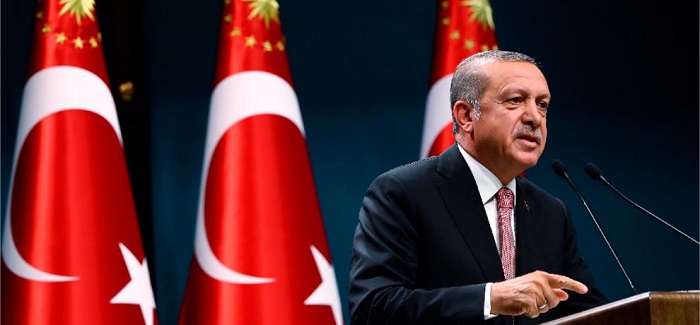Speaking at a joint press conference in the Albanian capital of Tirana with President Bujar Nishani, Erdogan said on Wednesday: "We give very great importance to peace, prosperity and stability in Balkans."
"We hope that the continuing tension, especially in Macedonia, will be solved through dialogue and that the peace which came to the country after the Ohrid Agreement will not be damaged."
Erdogan said that Turkey had suffered very much from "terror" over the past 30 years and it did not want any other country, in the Balkans or not and from any religious and ethnical background, to "pay such a fee."
"You cannot separate who wins or who loses from terror acts, the two parties lose, same as happens in war," Erdogan said.
Twenty-two people, including eight police officers, were killed during last weekend’s severe clashes between security forces and an armed group in the city of Kumanovo, near the Kosovo border, mainly inhabited by ethnic Albanians.
Ethnic tensions are regular in the multi-ethnic country that declared its independence from Yugoslavia in 1991, where about a quarter of the population of 2.1 million is ethnic Albanian.
In 2001, Macedonians and Albanians fought an armed conflict, which came to an end after the signing of the Ohrid Agreement, which gave Albanians more political rights.
But Albanians have claimed that the agreement has not been implemented.
Albanian President Bujar Nishani called on Macedonian authorities "to investigate as soon as possible and shed light rapidly and completely over this shadowy and unclear incident which has shaken not only Kumanovo, but also the international community."
"I call too, for an immediate stop to the efforts to turn that unclear episode into a source of inter-ethnical conflict,” Nishani said.
Many political analysts in Macedonia have suggested that Macedonian Prime Minister Nikolla Gruevski is using the incident to shadow the ongoing political crisis and wiretapping scandals which have shaken Macedonia in the last months.
Interior Minister Gordana Jankulovska, Transport and Communications Minister Mile Janakievski and the chief of Macedonian Security and Intelligence Agency, Saso Mijalkov - all considered close associates of Prime Minister Nikola Gruevski - resigned Tuesday amid the ongoing political crisis in Macedonia.
Zoran Zaev, the head of the Social Democrat Party, the main opposition party in Macedonia, has divulged scores of recordings since February which allegedly show Gruevski and intelligence chief Mijalkov ordered the illegal surveillance of up to 20,000 people, including ministers and journalists.
Opposition parties have staged several protests in the capital Skopje over the past week, calling on the prime minister to resign.
Erdogan attended the opening of the largest mosque in Balkans
Turkish President Erdogan sldo attended the opening of the Balkan’s largest mosque in Albanian capital Tirana.
"As Turkey we saw Albania and our brothers in here as part of our hearts,” Erdogan said at the inauguration of Preze Castle mosque. “Today also we regard all of our brothers in Albania and Balkans as our inseparable part."
The 10,000 square meters (108,000 square foot) mosque near the Albanian parliament will be able to hold 4,500 worshippers.
Erdogan says `parallel state` is terrorist organization
Erdogan labeled U.S.-based cleric Fethullah Gulen`s `parallel state` group a “terrorist organization.”
He said: "We accept this organization, which poses a threat to our state and nation, as a terrorist organization."
Erdogan made the remarks after four public prosecutors and a judge linked to the December 2013 anti-corruption investigation, which targeted senior officials and businessmen close to the government, were expelled from the judiciary.
The Justice and Development (AK) Party government has denounced the probe as a "dirty plot" by Gulen’s supporters in the criminal justice system.
Hundreds of police officers have been detained and judges and prosecutors reshuffled in the aftermath of the affair.
Erdogan`s one-day long visit to Albania came a year after the Soma coal-mine disaster forced him to cancel the visit planned to be held in May 2014.
His visit aims to boost economic relations and raise security cooperation between two countries.
Erdogan said the trade volume between the two countries was $430 million per year, adding: “My wish is for this trade volume to reach $1 billion per year."
Albanian President Bujar Nishani said Albanian-Turkish relations were already consolidated with traditional relations between the two peoples and strategic interests could also be shared.
Nishani expressed his and the Albanian people’s gratitude “for the support that Turkey, this friendly country, has given to Albania in years, including the recognizing of Kosovo’s independence, lobbying for the rise of countries that recognize Kosovo, the support for Albania’s integration to NATO, etc."
Recalling that Turkey is the fourth-biggest economic partner to Albania, the president said Turkish businessmen were welcome to invest in strategic sectors such as energy and transport in the country.
Kosovo, with a population more than 90 per cent ethnic Albanians, declared independence from Serbia in 2008 and is recognized by about 110 states, including U.S., Germany, France, and Turkey.
Albania, a Muslim-majority country with a population of around three million people, has also been a NATO member since 2009 and is a European Union candidate country.
More about:
















































